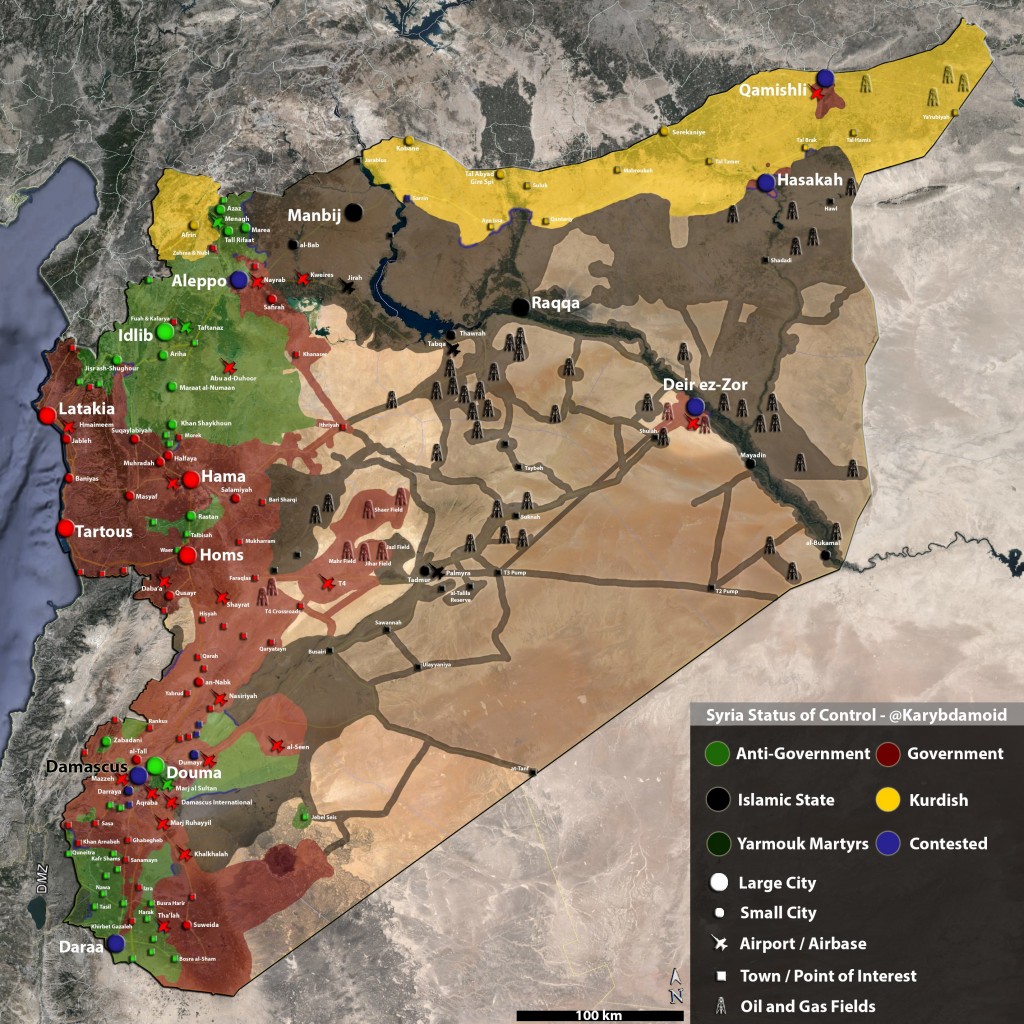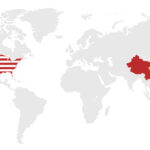After Paris: U.S. and Russian air strikes target ISIS’s $50 million monthly oil revenues
As the battle against ISIS continues, allied forces are increasingly targeting oil assets and the convoys of trucks being used to smuggle oil from ISIS-controlled oilfields. The idea is to cut off the major source of funding for the Islamic State’s barbaric terrorist activities.
It is believed that ISIS earns $40 million to $50 million per month from the sale of oil on the black market, with the Islamic State’s Diwan al-Rakaaez – its version of a Finance Ministry – reporting April revenues of $46.7 million, reports Business Insider. That makes oil trading the Islamic State’s single largest source of continual income for funding its attacks.
ISIS is believed to be producing around 30,000 BOPD from Syria, smuggled by middlemen in neighboring Turkey. In Iraq, ISIS produces around 10,000-20,000 BOPD, mostly from two oilfields outside Mosul, according to Ibrahim Bahr al-Oloum, a member of Iraq’s parliamentary energy committee and a former oil minister. The production from Iraq is not sold, however, but instead sent to Syria to makeshift refineries the group has set up to produce fuel products.

Both the United States and Russia have been stepping up airstrikes against convoys of tanker-trucks carrying oil as they leave ISIS oilfields this month.
Air strikes in the wake of ISIS’s Paris attacks
On Monday, an airstrike carried out by U.S. forces destroyed approximately 116 trucks, reports The New York Times. Earlier today, Russian General Staff spokesman Colonel General Andrey Kartapolov said the Russian air force has destroyed 500 fuel tanker vehicles that are illegally transporting oil from Syria to Iraq, since Russia began its bombing campaign on September 30, reports Russia Today.
Kartapolov also said that joint operations with the French Navy against ISIS are now being planned following the terrorist attacks against the French last Friday. French nuclear aircraft carrier Charles de Gaulle is set to rendezvous with a Russian guided missile cruiser off the coast of Syria in the near future, reports NPR.
The U.S. previously avoided attacking oil tanker convoys because of concerns over civilian casualties. ISIS members are not always behind the wheels of the trucks; instead, unaffiliated local traders purchase the crude from ISIS well below market prices in order to sell it in neighboring countries like Turkey. The proposition is a lucrative one for those looking to make money in war-torn Syria, and has, up to this point, largely shielded the convoys from U.S. airstrikes.
To reduce the risk of harming civilians, U.S. warplanes dropped leaflets about an hour before the airstrike warning drivers to abandon their vehicles. Strafing runs were conducted to reinforce the message.
Source: Russia Today
ISIS sells the crude to smugglers for discounted prices, sometimes $35 per barrel but as low as $10 a barrel in some cases, four Iraqi intelligence officials told the AP in separate interviews. The line of tanker trucks waiting to fill up with ISIS oil was sometimes as long as 6km (3.73 miles), according to locals.
In March, the militants were driven out of a major oilfield outside the northern Iraqi city of Kirkuk. Fear of airstrikes is preventing ISIS administrators from exploiting another large oilfield near Sinjar in northern Iraq, though production teams are sent there occasionally to quickly pump out oil and leave, the Iraqi intelligence officials said.
The Financial Times reported that ISIS changed it strategy this week by ordering truckers to stay away and instead pick up a receipt that gives them a specific time to return and fill up. Locals said that the increased aggressiveness of allied airstrikes may be enough to keep some tanker-truck drivers away, and prevent ISIS from maintaining production at current levels.
Combination of oil sales, “taxes” and bank heist is funding ISIS activities
Daniel Glaser, a U.S. Treasury official, estimated ISIS oil revenues at around $500 million a year, based on evidence they made around $40 million in one month in early 2015. The group is also believed to rake in hundreds of millions of dollars a year from “taxes” on commercial activities in the areas it rules, said Glaser, who is assistant Treasury secretary for Terrorist Financing in the Treasury department’s Office of Terrorism and Financial Intelligence.
That income is on top of the money that the militants first looted from the Iraqi central bank branch in the city of Mosul when they seized it in the summer of 2014 and other bank branches, which “at the time was thought to be anywhere between $500 million dollars to up to $1 billion,” Glaser told the AP.
Prior to today’s strikes against tanker-truck convoys, the focus of U.S. airstrikes has been against the small refineries established by ISIS. The U.S. strikes had destroyed 16 mobile refineries by the end of 2014. However, it is estimated ISIS can rebuild a single mobile refinery in 10 days for as little as $230,000, reports the Aberdeen Journal.

ISIS tells potential oil workers: “name your price”
The ISIS “finance ministry” reported 253 oil wells under its control in Syria, saying that 161 of them were operational. Maintaining the oil and gas complex ISIS has usurped is a monumental task, and one that requires specialized help. In order to attract talent to work in its oilfields, ISIS is essentially offering blank checks, says Dr. Christina Schori Liang of the Geneva Centre for Security Policy.
Liang said most people employed in the ISIS oil company would be local, but added that ISIS’s sophisticated online presence allowed it to make job offers to engineers elsewhere who are willing to join the Islamic State.
Liang said: “Oil is hugely important to ISIS and is helping fund its operation. It is recruiting online, with the promise of high salaries, flat screen televisions and a comfortable life – if you pledge allegiance to ISIS.”
“They can name their price, but when they get there do they discover they cannot leave, or their family will be harmed,” Liang added.
Borders in the region nearly impossible to secure
The Swiss academic warned that the global community must focus on destroying its markets – many using old smuggling routes established as sanctions-busting lifelines in Saddam-era Iraq.
She said: “The borders in the region are nearly impossible to secure and ISIS is running a criminal/terrorist enterprise with a business acumen that has no historical precedent.
“They are extremely smart. The caliphate acts largely as a mafia organization, allowing it to conduct business even if it is cut off.
“The people of the region have nowhere else to buy their oil and ISIS undercuts the markets.”
World powers search for a team solution
Russia recently submitted a new version of its resolution on fighting ISIS, two months after the U.S., Britain and France rejected a previous version at the United Nations due to disagreement over Syrian President Bashar al-Assad’s participation in efforts to defeat the Islamic State. Russia’s U.N. representative Vitaly Churkin said the new proposal called for greater cooperation among powers fighting ISIS, but still contains provisions to keep Assad in a positon of power, reports Dutsche Welle.
France also plans to submit a draft resolution to the U.N. Security Council, as President Francois Hollande called for solidarity in the fight against extremists following the attacks in Paris last week. Hollande said he would study the Russian draft and consider incorporating elements from it into the French draft resolution.






